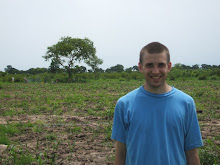Thanks again for all the great comments, and a special thanks to the chapter for coming up with those great questions. I have only just read the email, so I won't be able to answer any of them now, because I would rather prepare a proper answer for each of them. I'll likely devote the next blog post (and possibly a second one) to answering the questions. I'll also post the questions below for everyone to read so that they can know what to expect.
Because of the lenght of time that's passed, I'll have to settle for giving you a brief overview of everything, instead of going in depth into any one thing.
So first of all was the JF retreat. Most of us met in Tamale on Wednesday and waited several hours for our bus to arrive and take us to Damongo, where we would spend two nights before visiting Mole National Park. The bus ride was long an fairly brutal, but while waiting and along the way I was encouraged to try lots of different foods, that I had been hesistant to try out because of a paranoia of getting sick. And so I tried a Ghanaian orange for the first time, and had some coconut, some sugar cane, and most exciting of all... fried cheese!!! Best of all, none of them made me unwell! The road was so bumbpy it made your voice vibrate as you spoke, too bad the person next to you couldn't hear it over the clanging of the bus. We arrived in Damongo and began with short presentations from each of the JFs on thier placement. We were then given updates on some big changes that are in the mix for EWB. They include overall structural changes for the entire organization as well as changes to how things operate in West Africa and in Ghana. One big theme was the need for increased communication, between all parts of the organization. After sharing some of our chalenges and successes and offering advice to one another we set off for Mole National Park, where we saw elephants, warthogs, baboons, and crocodiles!
After the National Park we travelled back to Tamale to meet with the Long Term Volunteers. The ride was terribly long and we were all exhausted when we arrived, desperately in need of sleep. The next day we began more discussions and workshops. We learned about our different influencing styles. Turns out I'm an Expressor (surprised?). Appearantly I prefer to rely on feelings when making decisions and like to embellish stories to make them have more impact, the best role for me from a "management" point of view is motivation! We discussed strategy with the Long Terms and learned more about each of their specific placements.
On Monday, after that was all over, I headed home to Pong-Tamale. Once there I started to notice and rumbling in my tummy. Lets just say I was quite unwell for the next two days or so and was cursing whichever meal it might have been that had made me sick. I knew it wasn't any of the expiraments from the trip to Damongo because that was too long ago.
It made me think of a diagram that I had seen on another EWB volunteers blog. This diagram shows all the different ways faeces can get in your mouth! Yum!
 Somewhere along the line, one of those barriers wasn't there. Maybe something wasn't cooked well enough. Had I washed my hands well enough? Maybe flies landed on the food.
Somewhere along the line, one of those barriers wasn't there. Maybe something wasn't cooked well enough. Had I washed my hands well enough? Maybe flies landed on the food.Either way I was out of commission. And at a terrible time as well, there were only two days left before all the students went home for the summer. I had fully recovered by Thursday, just in time to attend the college's closing ceremony. So I said goodbywe to all the students I had met, and acted as official photographer for the two students who won awards of academic excellence.
My time since then has been focused on preparing things to move into my new place. I have a lock on the door now, and I'm in Tamale to buy a mattress and a fan. With luck I'll be living there by Monday!
And finally here are the questions from the chapter. The next time you hear from me I should have the answers to at least half of them.
1) What types of people are attending the college you at working at? - background/sex/age/numbers etc
2) What do you consider to be the greatest communication obstacle in your placement so far (if any)?
3) Is the government encouraging a certain type of entrepreneurship?
4) What happened to your laptop?
5) How is your host family?
6) What are the major differences in schools in Ghana and here in Canada
7) What ideas/principles learned, while working with EWB in St. John’s have you been able to usefully apply while working in Ghana?
8) In the short amount of time you've been there, do you feel like you’re already having an impact? if so, how do you plan to add on to it?
9) How are you adapting? Do you feel like you are experiencing any culture shock?
10) What parts of the culture are you finding really interesting? What are most surprising to you?
11) We know that you were involved with fair trade before you left, has your point of view changed since you have been there?
12) Do most people speak English as well as those at the college?
13) What is your most exciting experience so far?
14) What's available to do at the college in terms of academics? How similar is the teaching (style, depth) to say, MUN?
15) How much of an initial shock was there? How long did it take to get over?


